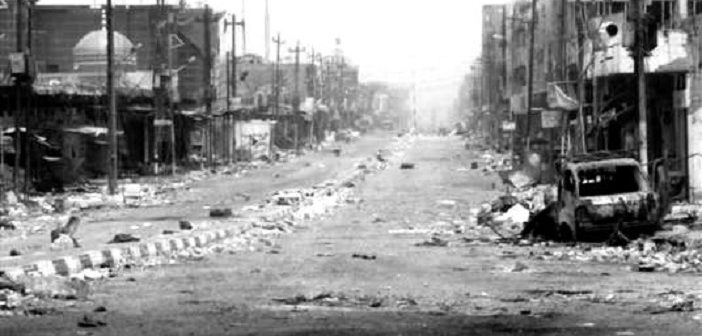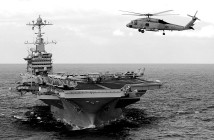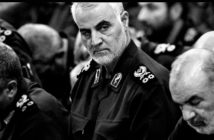Fallujah, the Iraqi city is located 60 km north-west of the capital city Baghdad. The people of Fallujah belong to different Arab tribes and Islam is the defining religion of the city. The city is known for the many mosque minarets and hence got the name of ‘The city of mosques’.
In 2003 when the Americans invaded Iraq, the majority of the people in Fallujah were against the presence of the American soldiers patrolling in the streets of Iraq. For them it was obvious that the Americans are occupants and invaded the country to control the oil wells. Therefore, groups of people in the city started to think about fighting the Americans who are considered to be the invading power that should be pushed out of the country.
The city turned into a base of resistance or as the Americans called it a city of insurgents. The insurgents used to attack and target the American’s convoys, patrols, and supply lines every day leaving casualties and injured among the US troops. The American government tried to start talks with the insurgent’s leadership but they demanded the Americans to start a complete withdrawal of the soldiers from the country before starting any talks. The Americans rejected the condition saying that it was impossible for them to just leave Iraq. The insurgents then kept following their plan to make the American government fall under pressure by losing soldiers every day.
Al-Zarqawi who was an essential member in Al Qaeda with Ben Laden showed up in Fallujah claiming that he will unite the different insurgent groups under one flag and he started a group called ‘Al-Tawhid wal Jihad’. The first beheading of a captive was made by al-Zarqawi himself, and the captive victim was an American contractor. This incident along with killing four Black Water contractors in the city hit the American’s nerve and they finally decided to attack the city in order to chase down Al Qaeda members – but the operation failed.
The US army did not manage to capture al-Zarqawi and to dismantle the Al-Tawhid wal Jihad terrorist group in the first Battle of Fallujah, however after extensive shelling and house to house combat Fallujah was finally conquered in the second battle. The first battle of Fallujah, from April until March of 2004 made it clear to the US army that they were up against an organized insurgent group. The Al-Tawhid wal Jihad (which later became ISIS) embedded into the population and drew some degree of support from it. Nevertheless, an Iraqi politician named Taha Bidaywi Hamed was elected by tribal leaders to head Fallujah’s town council in 2004 even though he was pro-American. After only one month in power, subsequent to the death of the Black Water contractors he resigned and stated that the general population wanted the Americans to leave the city.
A little less than a year after the first battle of Fallujah the town became the center of attention again. In the aftermath of the US rooting up insurgent groups from the city, the coalition turned over power to the Fallujah Brigade (Sons of Iraq Force), provided them with weapons, and tasked them to keep out Al-Tawhid wal Jihad and other terrorist groups. That only lasted until September as by then the insurgents were back in control and furthermore they laid their hands on the US weapons, which were supposed to be used to fight them – the Fallujah Brigade suffered a devastating defeat. The second battle of Fallujah was reported as having the most intense urban fighting by US soldiers since Vietnam, and there were reports of the use of phosphorus and cluster bombs dropped by US aircraft to take over the city once again.
After the heavy battles of 2004 al-Zarqawi’s group realized that it couldn’t fight coalition forces face to face and by occupying cities. By 2013 Al-Tawhid wal Jihad underwent several name changes, before becoming the Islamic State of Iraq and the Levant. Capitalizing on the destabilization brought on to both Iraq and Syria by the Arab Spring, the groups new leader Abu Bakr al-Baghdadi seized the moment. First it attacked and seized control of the town of Raqqa in Syria from the Free Syrian Army and the al-Nusra front. The fighting between al-Nusra and ISIS made the latter brake its allegiance to al-Qaeda and became its rival. The Islamic State of Iraq and Syria finally found a safe haven by controlling a provincial capital and much of the state of Raqqa in Syria. When protests started in 2012 and 2013 in Iraq centring in Fallujah, the group waited until the right moment to resurface in its historical stronghold.
In 2014, ISIS took control of the city and maintains a harsh rule; the people lived under the Islamic State rules since then. Most people realized that ISIS is not what they are hoping for the future of their kids though some people still followed and joined ISIS. Fallujah had a spiritual effect on the Arab (Sunni) tribes in Iraq and considered to be a symbol of honor since the city sheltered the groups of resistance, which stood against the American invasion in 2003. In June 2016 the Iraqi Forces, supported by the US airstrikes, liberated Fallujah from the hands of ISIS in an unexpected way. Many thought that the battle would last long but the people refused to fight beside ISIS and left the city running towards the Iraqi forces. If it is to prove anything then only that the people were desperate living under the rules of the Islamic State. The ISIS defence lines were collapsing fast before the advance of the Iraqi forces and the fighters had no choice other than to be killed or captured by the Iraqi Forces.
The fall of Fallujah made it clear that the battle of Mosul would not be as hard as it is expected and ISIS is already losing the war. The battle of Mosul will be the last one before announcing officially that ISIS has no control anywhere over the Iraqi soil.
The brutality of ISIS and its brutally cruel ways of dealing with their enemies lead them to lose most of their supporters. The people of Fallujah are happy to get their city back from the hands of ISIS, however there are concerns that the Iranian Militias might take ISIS’s place and start reprisals against the civilians in the city.




